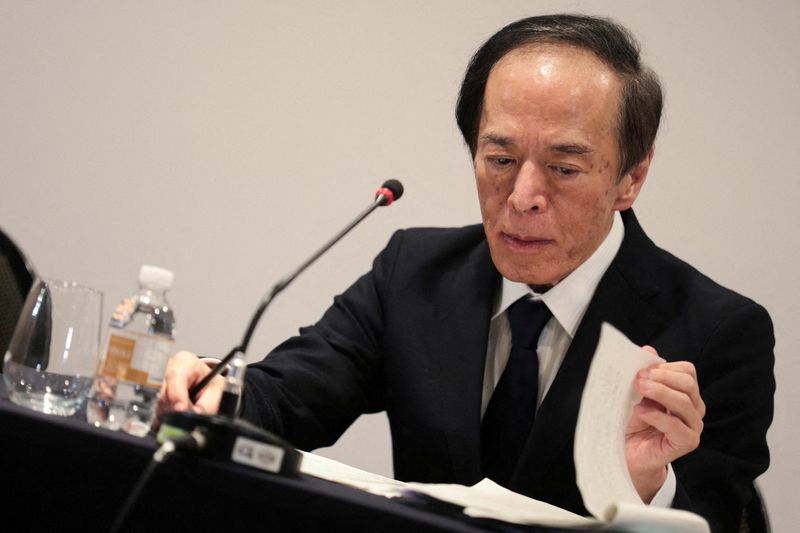
©Reuters. FILE PHOTO: Bank of Japan Governor Kazuo Ueda speaks during a news conference after attending the meeting of G20 finance ministers and central bank governors in Sao Paulo, Brazil, February 29, 2024. REUTERS/Carla Carniel /file photo
By Leika Kihara
TOKYO (Reuters) – Bank of Japan Governor Kazuo Ueda said on Tuesday the economy was recovering but also showing some signs of weakness, offering a slightly more gloomy assessment than in January in a nod to a recent run of weak data on consumption.
The remarks come ahead of the central bank’s policy meeting next week, where the board will discuss whether the outlook is bright enough to phase out its massive monetary stimulus.
Speaking in parliament on Tuesday, Ueda said consumption was weakening for food and daily needs due to rising prices. But he said household spending is improving moderately on hopes of higher wages in the future.
“Japan’s economy is recovering moderately, although weakness has been seen in some data,” Ueda said, when a lawmaker asked him about recent weak signs in consumption and capital spending.
The assessment was slightly less optimistic than that shown in the BOJ’s latest quarterly report released in January, which described the economy as “moderately recovering.”
Ueda offered few clues as to how soon the BOJ will end negative rates, a policy in place since 2016.
“We are focusing on starting a positive cycle of wage inflation, to judge whether we are approaching the sustainable and stable achievement of our price target,” he said.
“Various data has been released since January and we are likely to release more this week. We will review that data comprehensively and take an appropriate decision on monetary policy,” he said.
Finance Minister Shunichi Suzuki said Tuesday that Japan is not at a stage where it can declare deflation over, despite some positive developments such as high wage increases and record levels of corporate capital spending.
The Japanese economy grew at an annualized rate of 0.4% in the October-December period, narrowly avoiding a technical recession but burdened by sluggish consumption.
Despite these signs of economic weakness, many market participants expect the BOJ to end its negative interest rate policy by April as inflation remains above its 2% target and shortages intensify workforce pushes more companies to report exceptional wage increases.
Sources told Reuters that a growing number of BOJ policymakers are even warming to the idea of ending negative rates at their March 18-19 meeting over expectations of big pay rises in this year’s annual wage negotiations.
Economists expect the current wage negotiations, which end March 13, to result in an average increase of about 3.9% in annual pay for union workers at major companies — the largest increase in 31 years.
As part of efforts to sustainably reach its 2% inflation target, the BOJ currently guides short-term rates at -0.1% and the 10-year government bond yield around 0%.